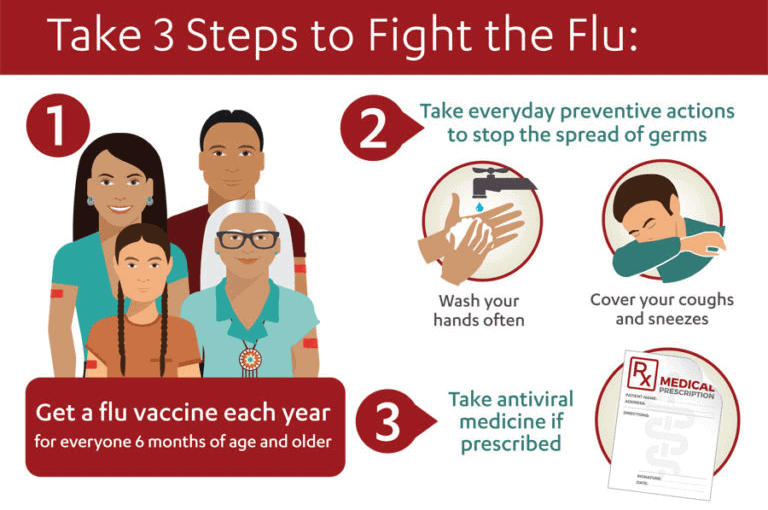Flu vaccines important for Native Americans
Published January 1, 2022By Chris Jennings
With many restrictions being lifted and more families getting together during the holidays, the 2021-2022 flu season is poised to be more severe than last season.
The Walgreens Weekly Flu Index shows that as of December 16, Oklahoma was ranked 6th highest for the number of flu cases. The Walgreens Flu Index is compiled using retail prescription data for antiviral medications used to treat influenza across Walgreens locations nationwide.
“The best way to reduce the risk of seasonal flu is to get vaccinated,” said Janice Hixson, Oklahoma City Indian Clinic’s Chief Medical Officer. “An annual vaccination is recommended because a person’s immune protection declines over time. Flu viruses also change frequently, so the vaccine composition is reviewed and updated each year based on which virus is making people sick.”
The CDC reported that flu activity and the number of people who received flu shots during the 2020-2021 season was very low, likely because of COVID-19 prevention measures. Now that more people are getting vaccinated against COVID-19 and getting together for the holidays, it’s important to get the flu vaccine as well.
“Thanks to the COVID-19 vaccine, many of us will be able to celebrate the holidays with our loved ones this year,” says Oklahoma State Department of Health Immunization Service Director Dr. Fauzia Khan. “But the COVID-19 vaccine does not protect against flu, so it is important individuals also get vaccinated for the flu to ensure the safety of their family and friends.”
The Centers for Disease Control and Prevention (CDC) has issued a health advisory concerning increased influenza A (H3N2) activity for this flu season. During seasons where the H3N2 strain has been prominent, it has been associated with more severe illness and death in persons over 65. The CDC also states the H3N2 strain evolves more rapidly to escape human immunity.
The quadrivalent flu vaccine available this flu season includes protection against the H3N2 strain. This season’s vaccine also contains protection against the H1N1 strain and two different Influenza B strains.
Brandi Burris, RN with the Choctaw Nation, says, “Every flu season is different, and influenza can affect people differently…flu can mean a few days of feeling bad and missing work, or it can result in more serious illness.”
The more severe aspect of illness would include hospitalization for things like pneumonia, bronchitis and even death. According to the CDC, Native Americans are at a higher risk of developing severe complications from the flu.
“Flu and pneumonia rank among the top 10 causes of death for American Indians and Alaska Natives,” said Burris. Native American women who are pregnant are at an even greater risk.
Changes in the immune system, heart and lungs during pregnancy make pregnant women more likely to experience severe illness from the flu. The CDC and the American College of Obstetricians and Gynecologists recommend that all pregnant women get a flu shot during flu season, regardless of their trimester.
There are several reasons a flu shot could be beneficial to both a mother and her child. Research done by the Mayo Clinic showed that high fever during pregnancy increases the risk of disabilities at birth. By getting a vaccine and limiting the effects of flu, the mother is also protecting her child.
During and after birth, antibodies from the flu vaccine are passed through the placenta and breast milk. These antibodies can help protect newborns who are more susceptible to the flu virus but can’t be given the vaccine until they are six months old.
Flu illness is more dangerous than the common cold for children. Children under five years old and especially those under two years old are at a higher risk of developing serious complications from the flu. “Each year, millions of children get sick with seasonal flu; thousands of children are hospitalized, and some children die from flu,” said Burris.

Booster
On top of flu vaccines, the Choctaw Nation is also offering COVID-19 booster shots for everyone over 18 who wants one regardless of tribal member status or residency.
The CDC recommends a COVID-19 booster dose if you are 18 or older and received the Johnson & Johnson vaccine at least two months ago or received both shots of either the Moderna or Pfizer COVID-19 vaccine at least six months ago.
“Previously, there were more requirements to be eligible for the booster dose,” explains Dr. Jason Hill, Chief Medical Officer for Choctaw Nation Health Services Authority. “Opening that eligibility to anyone who would like a booster dose over the age of 18 will provide even further protection against serious illness.”
The Nation is also offering COVID-19 shots for pediatric patients. The U.S. Food and Drug Administration (FDA) has approved the Pfizer COVID-19 vaccination for children ages 5 to 11.
“Previously, the only thing that stood between the kids and the virus was a mask. The vaccination will provide their immune systems the extra protection needed to be able to ward off any potentially serious symptoms,” said Dr. Jason Hill, Chief Medical Officer of Choctaw Nation Health Services Authority.
The CDC says it’s safe to get the flu and COVID-19 vaccinations at the same time.
You can make an appointment to receive the COVID-19 vaccine by calling 800-349-7026 ext. 6, using your myCNHSA app or visiting my.cnhsa.com. Call your local clinic for details on how to get your flu vaccine.